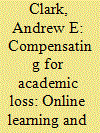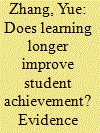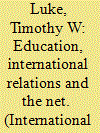| Srl | Item |
| 1 |
ID:
182770


|
|
|
|
|
| Summary/Abstract |
The COVID-19 pandemic has led to widespread school shutdowns, with many continuing distance education via online-learning platforms. We here estimate the causal effects of online education on student exam performance using administrative data from Chinese Middle Schools. Taking a difference-in-differences approach, we find that receiving online education during the COVID-19 lockdown improved student academic results by 0.22 of a standard deviation, relative to pupils without learning support from their school. Not all online education was equal: students who were given recorded online lessons from external higher-quality teachers had higher exam scores than those whose lessons were recorded by teachers from their own school. The educational benefits of distance learning were the same for rural and urban students, but the exam performance of students who used a computer for online education was better than those who used a smartphone. Last, while everyone except the very-best students performed better with online learning, it was low achievers who benefited from teacher quality.
|
|
|
|
|
|
|
|
|
|
|
|
|
|
|
|
| 2 |
ID:
161881


|
|
|
|
|
| Summary/Abstract |
We evaluate factors affecting the demand for MOOC by estimating its demand function in OECD countries and in China. We apply a Big Data approach to construct a proxy for MOOC demand using Google Trends for OECD and Baidu Index for China. Based on estimation results of various panel data models, we find that in both cases, higher unemployment promotes MOOC demand. However, in OECD countries, the proportion of individuals with high school level or higher education have positive and significant effects on MOOC demand, while in China, we observe positive and significant effects from internet speed and average income.
|
|
|
|
|
|
|
|
|
|
|
|
|
|
|
|
| 3 |
ID:
182817


|
|
|
|
|
| Summary/Abstract |
This paper examines the effect of online learning time on graduating students' test scores in a senior high school. Decisions regarding online education, including those related to participation and learning hours, are endogenous due to both reverse causality and omitted variables. This paper is the result of the natural experiment of the outbreak of COVID-19, which made every student to participate in online education when the spring semester began. In addition, this paper uses a value-added model controlling for the scores that preceded online education, which is a sufficient statistic of students' unobserved ability and motivation. If this cannot completely eliminate the endogeneity problem, it should be able to largely alleviate the problem. The results indicate that: online education has positive but limited impacts on test scores on average, particularly those in the subject of math within the natural sciences track; top-tier students are most positively affected by online education; and the benefits of online education vary among students with different backgrounds. The quantile regression suggests that a 10% increase in online education time raises math test scores by more than 0.25 for the students between the 0.60th and 0.80th quantiles. Surprisingly, it is evident that online learning time has a significant negative effect for some students in certain subjects. Finally, online education neither widens nor narrows the inequality of students' test scores.
|
|
|
|
|
|
|
|
|
|
|
|
|
|
|
|
| 4 |
ID:
052638


|
|
|